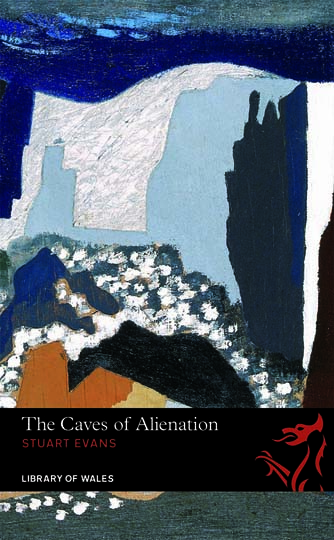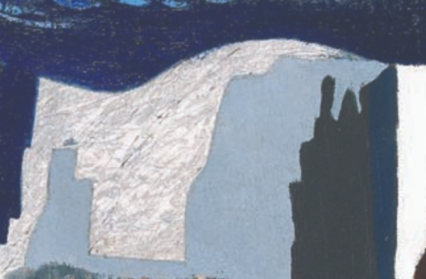Jon Gower casts a critical eye on The Caves of Alienation, a bold and original novel by Swansea-born Welsh novelist and poet Stuart Evans.
I once took this book on holiday with me: it certainly wasn’t chosen for its catchy title, so I must have been attracted by its heft and girth. Running to almost 600 pages it certainly weighs as much as your average airport-buy – a Ken Follett, say – but that’s where any comparison to easy reading and focused narrative must end.
Published in 1977 this very, very late modernist work revolves, like a lighthouse, around the death on a remote Welsh island of a famous writer, namely Michael Julian Caradock. Caradock is, indeed, famous enough to have biographers fighting over the right to his life, as it were. The novel takes its name from a Henry Reed poem called ‘Philoctetes’ which includes lines such as ‘That was my choice which now is my rejection:/ The caves of alienation, and the chant/ Of phantom dancers, the anger and the fury.’ It has as its structural premise, as Duncan Bush puts it in his foreword: ‘the unknowableness or irreducability (whether through intimate acquaintance, psychoanalytic theory, literary analysis, anecdote or gossip) of the human individual.’ We follow this odd, and often perverse individual through a life in which he is born into privilege, as his family has made a fortune out of industry. In the company of a older woman, coaching him for Oxbridge entrance exams, he learns about Latin and love. Caradock goes to Oxford, where he finds an all too brief happiness. In London he tastes writerly success and hangs out with the literati. He then returns, or retreats to Wales.

by Stuart Evans
You’d be right in thinking I ventured into The Caves of Alienation again with a heavy heart. Lord, my very ventricles were leaden. It is without doubt a bold and original work, but that’s no guarantee of readability. I’ll let one sentence – Henry Jamesian in its length if not its elegance – offer just an idea of the Stuart Evans style, with its meandering, philosophical drift:
Whatever it was that spring afternoon, in an absurdly ornamental garden of a country palace that neither of us particularly wanted to visit, with the normally gentle landscape of Oxfordshire across the river seeming wild in comparison with the formalities of Duchene, it was something that both of us understood without speaking a word, without even touching: it was commitment, it was trust, it was mutual desire, it was a will to take and to give, it was the relief from the pain and anxiety that comes from the unconditional surrender of one’s own existence, however briefly, to someone else; what one would dearly wish Death to be and fears that it’s not.
There’s plenty more where that came from. Now this is not to shy away from novels of willful experiment: the likes of Julio Cortazar, B.S. Johnson, Robert Coover and, of course James Joyce help make the novel, well, novel. But The Caves of Alienation is missing something. Maybe it’s just too inchoate, or maybe there is too much banal writing. Or maybe it’s just that some of the book’s components, such as the television and radio scripts the reader is invited to piece together, just don’t convince. It would be a pretentious TV producer indeed who allowed voice-overs such as ‘The fatal flaw in a man of high talent who rejected first of all his heritage, only to find a vacuum, a void, which he sought to fill with the ersatz febrility of London Bohemianism: trying to live up to a dandified image of an âme maudit whose debauchery was sad and anachronistic.’
One has to applaud the Library of Wales for republishing a book which is, in the words of fellow novelist Duncan Bush’s preface ‘a complex and equivocal work; and one that consciously distances itself from most of the English-language fiction written in Wales in the twentieth century, not only in its multivocal style and experimentalism but also in its class standpoint and sense of what are often referred to as “roots”.’
It won’t be to everyone’s taste, and it certainly wasn’t to mine. Maybe I’ve become too conservative in mid-life. Maybe the idea of a modernist novel that appears many, many decades after the creative convulsions of Joyce, Picasso and Faulkner make it seem too much an artistic statement written after the event. Complex it most certainly is, and challenging in the extreme. As curate’s eggs go, this one is about the size of an ostrich’s, and equally daunting to handle.












